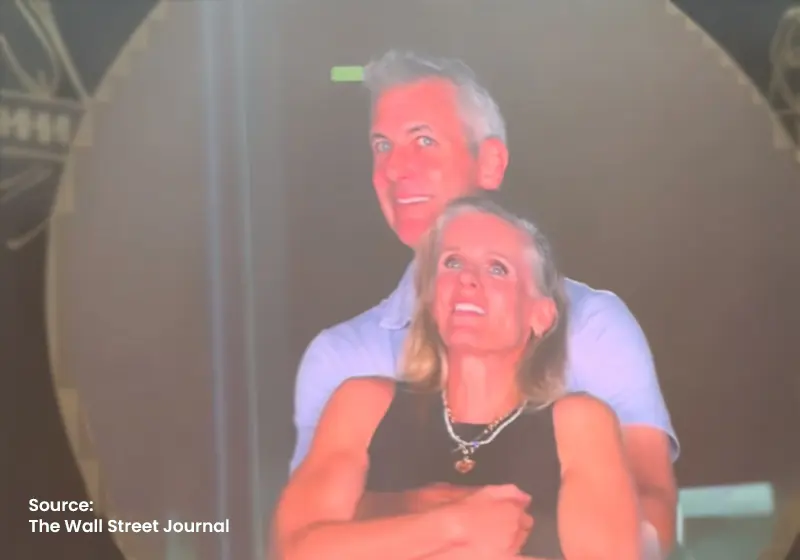The stadium slip that sparked a scandal
On July 16, 2025, Coldplay’s concert in Boston took an unexpected turn. During the band’s “Kiss Cam” segment at Gillette Stadium, the camera landed on Andy Byron, then-CEO of data orchestration company Astronomer, sitting beside Kristin Cabot, the company’s Head of HR. Their awkward, frozen reaction drew light teasing from Chris Martin on stage. Within hours, a clip of the moment went viral.
By the end of the day, it had tens of millions of views. By the end of the week, both executives were placed on leave, and Byron resigned. The internet ran wild with speculation, memes, and mockery, turning a personal moment into a global spectacle.
How did a 15-second video break the internet?
A moment that, to be fair, in the grand scheme of things, is quite inconsequential turned into one of the most viral cultural spectacles in decades. When there is so much going on in the world, how come this specific clip became the butt of the internet’s jokes?
- Power meets cringe
A CEO and a senior HR exec on camera, caught in a questionable act, is the perfect storm of workplace drama and awkward vibes. As one can expect, viewers read between every single line. - No PR filter
It was unscripted, uncomfortable, and perfectly packaged for social media. - Low stakes, high drama
There were no criminal charges, no policy violations. Just enough ambiguity to make it meme-worthy without feeling too heavy to joke about.
The fake statement that made it worse
As the clip spread, a fake apology surfaced. An image claiming Byron had gone so far as to blame Coldplay for embarrassing him. The source turned out to be a satirical Twitter account. But the internet went wild, so much so that Astronomer had to issue a clarification that no such statement was made.
It felt so real because it fit the narrative people already believed. A detached CEO making tone-deaf remarks is a movie we have all seen before. That believability made the misinformation harder to stop, and that much more damaging.
When brands join the pile-on
Brands saw the wave, and many jumped on. The likes of Tesla, IKEA, Hulu, StubHub, and NYC Sanitation had something to say. Amul dropped a cartoon nod to the scandal, as they do. Zomato posted a sly tweet. While no names were named, the subtext was loud and clear.
The internet loved it, and these responses did great metrics-wise. But it raises serious questions like: Is a viral HR crisis fair game for brand banter? Where do we draw the line between culture-jacking and callousness?
It worked for engagement, but it also highlighted how brands can risk playing to the crowd at the cost of empathy.
Meme culture flattens everything
This story went viral simply because it was perfectly memeable. But when things become memes, context collapses. Everything gets reduced to punchlines and pixels.
An awkward video, a Coldplay pun, a fake quote and a massive career fallout later, the deeper story was lost to scroll speed. This is the price of virality.
What brands and leaders should take away
- Context still matters
The most viral stories are mostly not the most important ones. Be cautious when commenting on real people facing real consequences. - Tone is everything
Speed is good, but tone is what people tend to remember. Being clever is not a free pass to be careless. - Virality can be a liability
You do not necessarily have to do something wrong to become the internet’s main character. Sometimes, being misunderstood is all it takes. - Correct quietly, not loudly
Astronomer did not tweet jokes or get defensive; they clarified the facts, then stepped back. It was definitely the right call. - Human first. Brand second
Being human does not mean jumping onto every joke. Sometimes, it means knowing when to shut up.
Turning a crisis into a campaign
Just when the story seemed too messy to control, Astronomer flipped the script, quite literally. They hired Gwyneth Paltrow, Coldplay’s lead singer Chris Martin’s ex-wife, as a “very temporary spokesperson” in a tongue-in-cheek video that ignored the scandal entirely. Paltrow served deadpan lines like, “Astronomer has gotten a lot of questions…so I’m here to answer the most common ones.” On-screen text posed questions like “OMG! What the actual f‑‑‑” which she promptly cut off before redirecting the message to data automation and Apache Airflow.
The video, produced by Ryan Reynolds’ Maximum Effort agency, never addressed the scandal, and instead sidestepped it with wit, celebrity casting, and self-aware charm. Viewed over 35 million times in 24 hours, it delivered an unexpected PR win. Astronomer’s interim CEO Pete DeJoy described it as “surreal,” while many called it a “PR masterclass” or “marketing jiu‑jitsu”.
A kiss cam moment, A mirror for the internet
This whole fiasco is a good case study on how quickly the internet decides who gets to be the punchline that day and how little it takes to get there.
A short clip and a fake statement that felt just real enough, and suddenly you are not a person anymore, you are content. That is what made this spiral. Not outrage, but the sheer entertainment value of awkwardness at scale.
What brands and leaders should take from this is a reminder that once people start laughing, it is already too late to correct the story. Memes do not wait for context, and silence always says something.
We suggest doing less and saying only what is necessary (or changing the conversation entirely). Read the room before you enter it. And whatever you do, do not try to outwit the internet. You will lose.
Remember, while the memes may fade, the screenshots stay.

